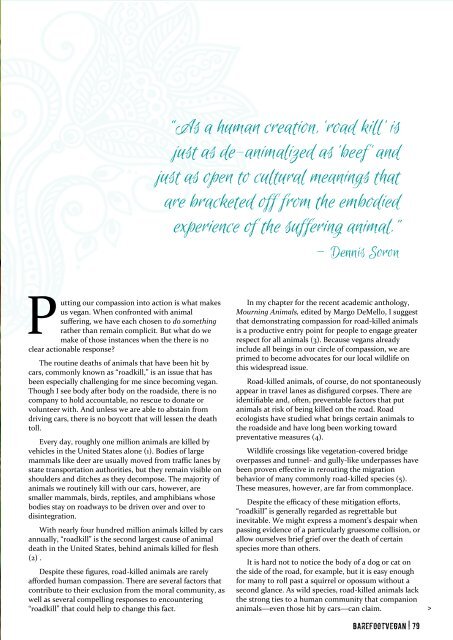Barefoot Vegan Mag Jan_Feb 2017
Create successful ePaper yourself
Turn your PDF publications into a flip-book with our unique Google optimized e-Paper software.
P<br />
utting our compassion into action is what makes<br />
us vegan. When confronted with animal<br />
suffering, we have each chosen to do something<br />
rather than remain complicit. But what do we<br />
make of those instances when the there is no<br />
clear actionable response?<br />
The routine deaths of animals that have been hit by<br />
cars, commonly known as “roadkill,” is an issue that has<br />
been especially challenging for me since becoming vegan.<br />
Though I see body after body on the roadside, there is no<br />
company to hold accountable, no rescue to donate or<br />
volunteer with. And unless we are able to abstain from<br />
driving cars, there is no boycott that will lessen the death<br />
toll.<br />
Every day, roughly one million animals are killed by<br />
vehicles in the United States alone (1). Bodies of large<br />
mammals like deer are usually moved from traffic lanes by<br />
state transportation authorities, but they remain visible on<br />
shoulders and ditches as they decompose. The majority of<br />
animals we routinely kill with our cars, however, are<br />
smaller mammals, birds, reptiles, and amphibians whose<br />
bodies stay on roadways to be driven over and over to<br />
disintegration.<br />
With nearly four hundred million animals killed by cars<br />
annually, “roadkill” is the second largest cause of animal<br />
death in the United States, behind animals killed for flesh<br />
(2) .<br />
Despite these figures, road-killed animals are rarely<br />
afforded human compassion. There are several factors that<br />
contribute to their exclusion from the moral community, as<br />
well as several compelling responses to encountering<br />
“roadkill” that could help to change this fact.<br />
In my chapter for the recent academic anthology,<br />
Mourning Animals, edited by Margo DeMello, I suggest<br />
that demonstrating compassion for road-killed animals<br />
is a productive entry point for people to engage greater<br />
respect for all animals (3). Because vegans already<br />
include all beings in our circle of compassion, we are<br />
primed to become advocates for our local wildlife on<br />
this widespread issue.<br />
Road-killed animals, of course, do not spontaneously<br />
appear in travel lanes as disfigured corpses. There are<br />
identifiable and, often, preventable factors that put<br />
animals at risk of being killed on the road. Road<br />
ecologists have studied what brings certain animals to<br />
the roadside and have long been working toward<br />
preventative measures (4).<br />
Wildlife crossings like vegetation-covered bridge<br />
overpasses and tunnel- and gully-like underpasses have<br />
been proven effective in rerouting the migration<br />
behavior of many commonly road-killed species (5).<br />
These measures, however, are far from commonplace.<br />
Despite the efficacy of these mitigation efforts,<br />
“roadkill” is generally regarded as regrettable but<br />
inevitable. We might express a moment’s despair when<br />
passing evidence of a particularly gruesome collision, or<br />
allow ourselves brief grief over the death of certain<br />
species more than others.<br />
It is hard not to notice the body of a dog or cat on<br />
the side of the road, for example, but it is easy enough<br />
for many to roll past a squirrel or opossum without a<br />
second glance. As wild species, road-killed animals lack<br />
the strong ties to a human community that companion<br />
animals—even those hit by cars—can claim.<br />
BAREFOOT<strong>Vegan</strong> | 79<br />
>





